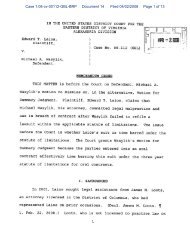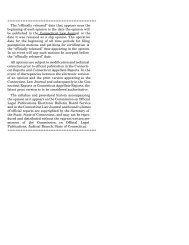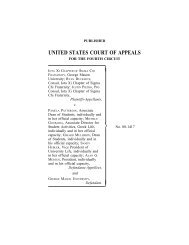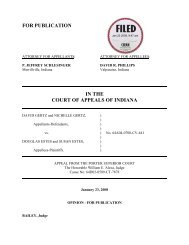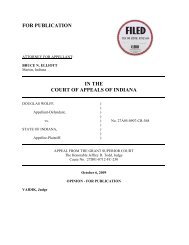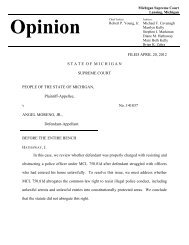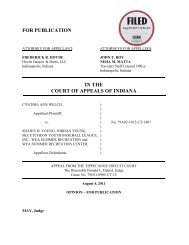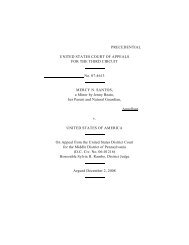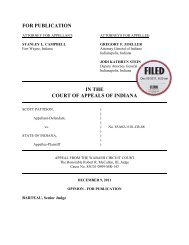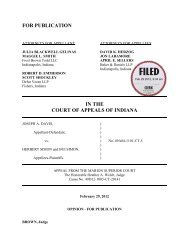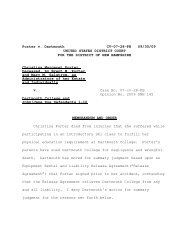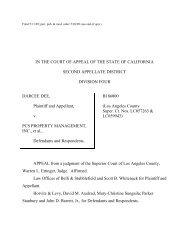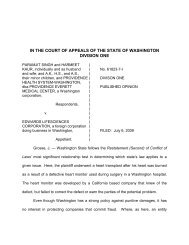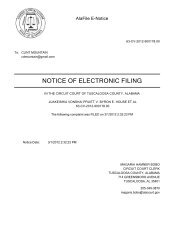State of Indiana v. Adam L. Manuwal
State of Indiana v. Adam L. Manuwal
State of Indiana v. Adam L. Manuwal
Create successful ePaper yourself
Turn your PDF publications into a flip-book with our unique Google optimized e-Paper software.
a place other than on a highway." Ind. Code § 9-30-5-9. 4<br />
Thus, regardless <strong>of</strong> where the defendant's driving occurred, whether on public or private<br />
property, and even if on the defendant's own property, the <strong>State</strong> is authorized to charge him with<br />
intoxicated driving <strong>of</strong>fenses pursuant to <strong>Indiana</strong> Code §§ 9-30-5-1 and 9-30-5-2.<br />
Several decisions <strong>of</strong> the Court <strong>of</strong> Appeals have likewise applied statutes prohibiting oper-<br />
ating a vehicle while intoxicated to driving on private property. See, e.g., Chilcutt v. <strong>State</strong>, 544<br />
N.E.2d 856, 859 (Ind. Ct. App. 1989) (applying statute to driving on private property in a rural<br />
area, emphasizing <strong>State</strong>'s strong interest in protecting the health and safety <strong>of</strong> its citizens, and<br />
referring not only to third persons but also "the danger the defendant presented to himself");<br />
Huey v. <strong>State</strong>, 503 N.E.2d 623, 626 (Ind. Ct. App. 1987) (affirming conviction <strong>of</strong> intoxicated<br />
driver <strong>of</strong> car stopped at a gas station, and holding statute applies to "drunk drivers on private<br />
property"); <strong>State</strong> v. Carter, 424 N.E.2d 158, 160 (Ind. Ct. App. 1981) (holding that statute prohi-<br />
biting driving while intoxicated applied to defendant driving on a private parking lot).<br />
The defendant's brief makes a passing assertion that extending "the OWI provisions to<br />
[the defendant's] own private property violates [his] constitutional rights." Appellee's Br. at 6.<br />
He does not support or develop this claim, however, and we thus decline to address it. See Over-<br />
street v. <strong>State</strong>, 877 N.E.2d 144, 153 n.4 (Ind. 2007); Harrison v. <strong>State</strong>, 707 N.E.2d 767, 777 (Ind.<br />
1999); Ind. Appellate Rule 46(A)(8)(a).<br />
We reverse the trial court's order granting the defendant's motion to suppress. 5 This<br />
cause is remanded.<br />
Shepard, C.J., and Sullivan, Boehm, and Rucker, JJ., concur.<br />
4 This provision was first enacted in 1990. P.L. 84-1990, § 4, 1990 Ind. Acts 1706 (enacted as former<br />
section 9-11-2-9). An earlier statute had declared that the provisions relating to post-accident duties, reports,<br />
financial responsibility, and driving while intoxicated "shall apply upon highways and elsewhere<br />
throughout the state." Former Ind. Code § 9-4-1-22 (first enacted in 1939).<br />
5 The defendant further argues that his trial court challenge asserted the absence <strong>of</strong> probable cause to order<br />
a blood test <strong>of</strong> the defendant. We decline to address this issue because it was not the basis <strong>of</strong> the trial<br />
court's order granting the defendant's motion to suppress.<br />
4



